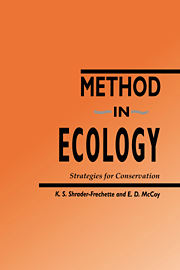Book contents
- Frontmatter
- Contents
- Acknowledgments
- 1 Introduction: What ecology can't do
- 2 Ecological concepts are problematic
- 3 Ecological theory is problematic
- 4 Ecological science is value laden
- 5 What ecology can do: The logic of case studies
- 6 Ecology and a new account of rationality
- 7 Objections to ethical rationality in ecology
- 8 A case study: The Florida panther
- 9 Policy aspects of the Florida-panther case
- 10 Conclusions
- References
- Name index
- Subject index
- Revisions (1993 printing)
5 - What ecology can do: The logic of case studies
Published online by Cambridge University Press: 08 January 2010
- Frontmatter
- Contents
- Acknowledgments
- 1 Introduction: What ecology can't do
- 2 Ecological concepts are problematic
- 3 Ecological theory is problematic
- 4 Ecological science is value laden
- 5 What ecology can do: The logic of case studies
- 6 Ecology and a new account of rationality
- 7 Objections to ethical rationality in ecology
- 8 A case study: The Florida panther
- 9 Policy aspects of the Florida-panther case
- 10 Conclusions
- References
- Name index
- Subject index
- Revisions (1993 printing)
Summary
inThe Evolution of Physics (1947), Albert Einstein claimed that physical concepts are free creations of the human mind and not uniquely determined by the external world. Much of our argument in the previous four chapters has been to show that, at least in contemporary community ecology, Einstein is in part correct. Ecological concepts and theories, as partially free creations of the human mind, are not uniquely determined by the external world. If they were, they would not be so riddled with ambiguity, imprecision, and unavoidable methodological value judgments.
Having illustrated the difficulties associated with various ecological concepts, theories, and value judgments, it may seem that we have “pulled the rug” out from under ecology. If ecology is beset with conceptual and methodological problems, how can it provide a scientific foundation for environmental policymaking? In this and the four subsequent chapters, we argue that, despite our pessimism about the predictive power of general ecological theory in specific environmental applications, we nevertheless believe (1) that general theories do have significant heuristic power, (2) that numerous lower-level theories aid us in environmental management, and (3) that, in particular, naturalhistory information has much to contribute to practical problemsolving in conservation and preservation. Therefore, we believe that pessimistic conclusions about the importance and utility of current ecology are not warranted. First, we examine the arguments of two prominent pessimists, biologist Robert Henry Peters and philosopher Mark Sagoff. Next, we examine some of the problems with ecological laws and theories and show how we might re-conceptualize laws in ecology so as to make them more defensible and more accurate.
Information
- Type
- Chapter
- Information
- Method in EcologyStrategies for Conservation, pp. 106 - 148Publisher: Cambridge University PressPrint publication year: 1993
